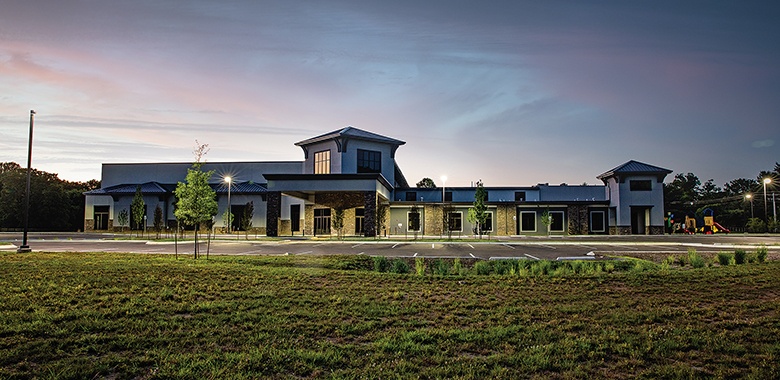
For Franklin Christian Church, the road to a new facility was paved with obstacles — which turned into opportunities.
By RaeAnn Slaybaugh
The pre-construction planning phase for Franklin Christian Church’s (FCC) new facility began in 2016, focusing on the programming and requirements for the space.
But the story of how it came to be starts even further back.
“Then, a ‘God thing’ happened”
Literally off the street, leaders at Franklin Christian Church were presented with the opportunity to purchase 25 acres of land just down the road from their current campus.
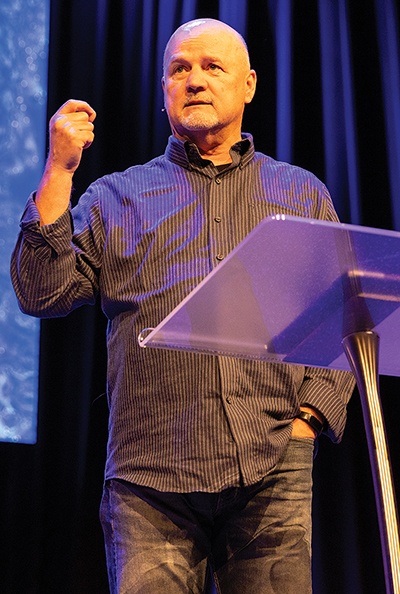 A representative from a large realty agency in the Nashville area stopped into the tutoring company office where Holloway’s wife worked. Ostensibly, the rep was offering up extra leased space, as more was available in the area. When the tutoring company declined, he asked offhandedly: “Well, do you know anybody who’s looking for land?”
A representative from a large realty agency in the Nashville area stopped into the tutoring company office where Holloway’s wife worked. Ostensibly, the rep was offering up extra leased space, as more was available in the area. When the tutoring company declined, he asked offhandedly: “Well, do you know anybody who’s looking for land?”
As it turns out, the property he was referring to was located less than half a mile from FCC, and on the east side of the interstate, as desired.
Right away, church leaders and the landowner discussed a sale, but — surprisingly — it was like pulling teeth. Possibly he hoped that homes would be built on the property instead. “At one point, he told us to go away,” Holloway recalls.
A year later, the owner changed his mind. He would sell the land to the church if it could make an immediate offer. Church leaders did, and FCC closed on the property in 2015.
It was a few years before they started building on the site, a timeline which actually turned out to be a blessing; a lot happened internally during that time. Over this period, Pastor David Welsh took the helm, relocating from a congregation in Wichita, Kans. FCC elders contacted him directly, since he not only was a great candidate to unify the church body but also to lead a major building project — he’d headed up eight such projects in his 42 prior years of ministry, two of which were relocations.
As Welsh explains, having a few years to navigate these internal challenges before beginning a major construction project was a benefit because “it gave the church time to heal.”
“When everything was sort of on hold, it enabled me to establish my ministry and to earn trust from our people and to set the stage for a year or two of just coming together, uniting, and casting the vision of what God was going to do with the new church,” he explains.
Those plans were significant…
But before finally moving forward with the building project, the elder board needed to find the right partner to help them translate their vision into reality. In 2015, they attended a church facilities conference in Dallas and met with several builders.
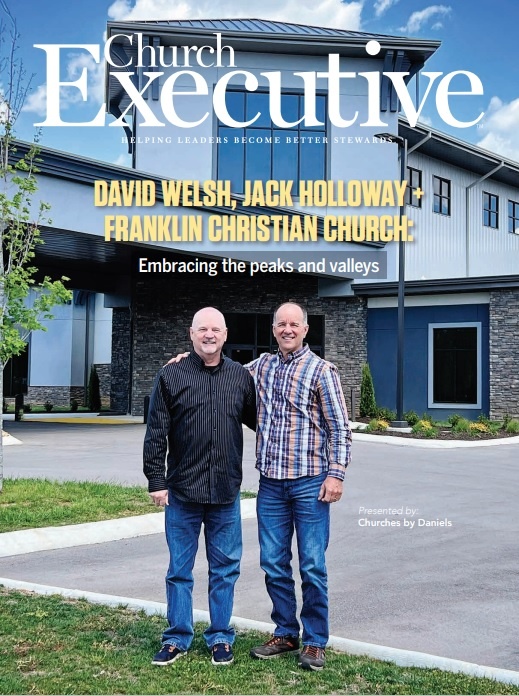
“That’s where we were first introduced to Churches by Daniels,” Holloway recalls. “We really liked how they operated, so we continued the dialogue.” After vetting four firms, the board made the decision to move forward with Churches by Daniels.
The pre-construction planning phase began in 2016. The builder team came back to the elder board with a project that called for full design services, including civil engineering, architect, mechanical, electric, plumbing, and interior, plus a complete audio-visual infrastructure. The facility would span more than 47,000 square feet and house a 688-seat sanctuary featuring stadium-style seating.
Perhaps most important, however, it would offer large, open gathering spaces.
“The one thing that we stressed to them most was the need for fellowship space,” Welsh says. “In the old building, I think all we had was 600 square feet.”
The design team understood the assignment: more than 6,000 square feet of gathering space was planned, with high ceilings and plenty of natural light. A café area lets churchgoers sit and talk. A large student center fosters fellowship among the church’s young people.
“Those were the main ingredients that we absolutely fell in love with,” Welsh recalls.
Q: How did you balance your church leadership roles with the need to be involved in a massive building project?
David Welsh: I’d been through building projects before. I knew I had to maintain focus on the spiritual — on the people and on their continued faith journey. So, I did that.
I leaned on Jack [Holloway]. I leaned on our other leaders. And I would tell any pastor who’s going through a building project: You’ve got to trust your people. Trust them to do what you might want to get involved in, but you don’t need to be involved in.
I attended very few building committee meetings; Jack took care of that. He’d only bring me in when I was needed, and that was fine.
Jack Holloway: Yeah, so, my background is in operations and management. I worked for Coca-Cola for a number of years, and for a bank. I owned a residential construction business. It’s like God planned for me to have all this relevant experience.
And David is right: we had an agreement that he would focus on keeping the flock moving forward, because we’d had had some issues related to this in the past.
I don’t mind telling you it was a strain on me. For about eight months, I worked seven days a week, 24 hours a day, because there was so much work to do.
Meanwhile, David was leading the church through COVID, trying to keep people together and figure out where we could meet, because there was a period of five months when we had no home. We met in a performing arts center, in a school, in a tent up on the hill [where the new church is now located], on the concrete pad of the new building … it was quite a challenge.
God showed us the way and God provided the resources. There were times when I thought we’d run out of money — every day, really — and somehow it all worked out. It was very challenging, but I think it spoke well for our church as a whole, how we stayed knitted together as a congregation.
David: Yeah, Jack and I had a lot of pep rallies just between the two of us.
Jack: Yes. Lots of mutual encouragement.
Overcoming obstacles to help share the Word
While the 25 acres the church purchased was no doubt a gift from God, it wasn’t without its challenges.
Schematic design, permitting, and sitework were all in order. Some existing structural issues would require civil engineering, utilities, and the addition of retention ponds.
“Luckily, we were able to put the entire project on a small piece of a big parcel of land,” explains Charlie Daniels, president & CEO of Churches by Daniels. “Through the design and architecture process, it was clear the facility needed to move to the back of the property for engineering purposes. Their new church is built on a hillside.”
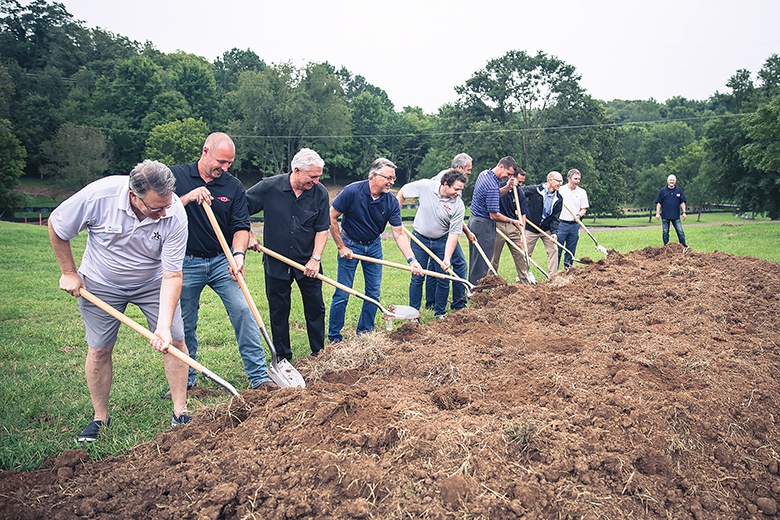
Interestingly, positioning the new facility this way actually helped Daniels and his team draw out the beauty of the surrounding landscape. A winding, tree-lined entry leads up to the new building. Its stone exterior offers a peaceful, warm first impression.
“Franklin Christian Church’s new location is a gorgeous, natural wonder,” he points out. “Our team worked to ensure the building would blend well with these surroundings.”
Pastor Welsh agrees: “You feel like you’re out in the country.”
The hilltop location was even incorporated into the church’s capital campaign, called ‘Take the Hill.’
“We wanted the architecture, on the outside especially, to resemble buildings that you might see in the country,” Welsh explains. “It needed to be aesthetically pleasing, but also fit in to the houses and the farms around us.”
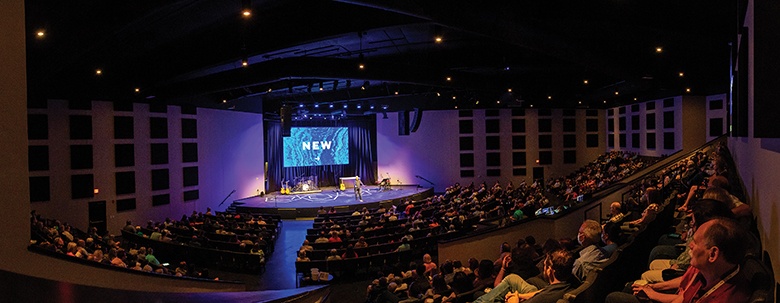
Not the last hurdle
Along the way, it became necessary to value-engineer about $4 million out of the project — not unusual for large church projects, especially ones undertaken during COVID (as this one was). Although the church remained financially stable and retained its core group of people, FCC was still under contract to sell its existing building. Additionally, church leaders got a wake-up call from their capital campaign consultant, who advised that they’d need to start over with their design.
“It was kind of an a-ha moment, because we knew [the consultant] was right,” Holloway says. “And really, God knew what we were getting into, too.”
Prayer was the first step in navigating the new budget directive.
“It was at the foundation of everything,” Welsh recalls. “We had prayer time together any chance we got. Our staff prayed together. We’d go up on the construction site and pray up there.”
Leaders passed out prayer calendars detailing what staff and church members should be praying for related to the building project.
“Anything that we could do, we presented it in prayer — not only to God, but before our people to keep them involved, to keep them engaged,” Welsh adds.
In the end, eliminating square footage was the best way to meet the required reduction in budget. Despite this, Holloway says that ministry has continued unhindered. The worship center is intimate, with risers that let the congregation feel close to the speaker, but with expansion areas for future seating on either side of the building.
“Honestly, I think it made more sense for us financially; it was better stewardship,” Holloway says. “I don’t think [Pastor Welsh], or I, or anybody here in the church or on staff or on the board has regretted planning the building to make the cost more feasible for our congregation.”
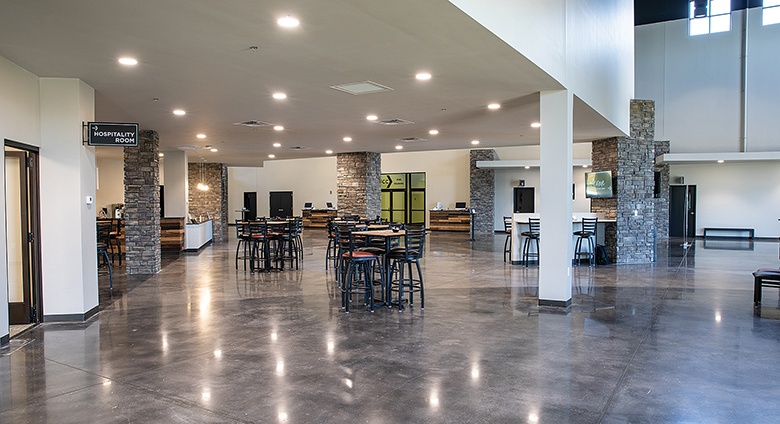
QUICK FACTS ABOUT
FRANKLIN CHRISTIAN CHURCH:
Year established: 1985
Number of staff (full- and part-time):
12 / 35 preschool teachersAverage weekly attendance: 897
2023 budget: $3.2 million
Hindsight is 40/40
In a unique twist, FCC was (almost) able to keep its original address despite a total relocation.
Its original address was 4040 Murfreesboro Road. The land FCC leaders purchased for the new building was three parcels knitted into one parcel by deed. The original owner kept 10 acres and the 4038 street address. Soon after, FCC leaders discovered that 4040 was available.
“We went from 4040 Murfreesboro Road to 4040 Clovercroft Road,” Welsh laughs. “God just worked that out.”
The 4040 theme is echoed in the church’s 4040 Café and in a monthly songwriters’ night called 4040 Presents. “We think it shows the alignment,” Welsh adds. “It allows our people to share the whole story of how God led us from one location to the other.”
That story has clearly resonated: as of press time, FCC is preparing to celebrate its first anniversary in the new facility.
“God gets the glory. God receives the praise,” Welsh says. “A lot of people donated their time, their treasures, their skills, everything; but it’s God who is responsible for us being here. So, we’re just going to bless him that day with worship.”


